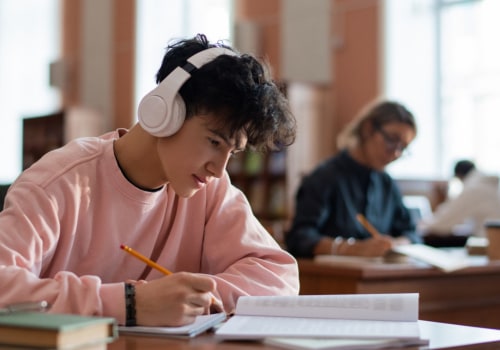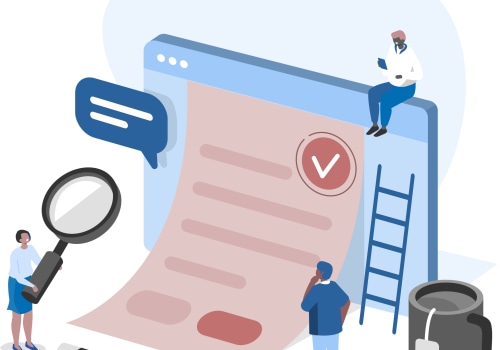Welcome to our comprehensive guide on understanding copyright laws for students! As students, it's important to have a solid understanding of copyright laws in order to avoid any potential legal issues and properly cite sources in your academic work. In this article, we will dive into the world of copyright laws, providing you with all the necessary information and tips to navigate through this complex topic. Whether you're writing a research paper, thesis, or simply want to expand your knowledge on the subject, this article is a must-read for all students. So let's get started and gain a better understanding of copyright laws together!In today's digital age, it's more important than ever for students to understand copyright laws and how they apply to their academic writing.
As a student in the UK, researching dissertations and academic writing can be a daunting task. Not only do you have to navigate through complex subjects and sources, but you also need to be aware of copyright laws and how they apply to your work. In this article, we will break down everything you need to know about copyright laws, as well as provide tips and techniques for improving your writing skills and avoiding plagiarism. Firstly, we will cover the basics of copyright laws in the UK, including what copyright is, who it applies to, and what protections it offers. This knowledge is essential for students to understand their rights and responsibilities when using sources in their academic work. Next, we will dive into tips and techniques for improving your writing skills.
This section will cover topics such as proper referencing, structuring your dissertation, and writing effective literature reviews. These skills are crucial for producing high-quality academic writing that meets the standards of your institution. Additionally, we will provide resources and tools to help you with specific aspects of academic writing, such as referencing tools and plagiarism checkers. These tools can make the writing process easier and more efficient, while also ensuring that your work is properly cited and free of unintentional plagiarism. To further understand the importance of copyright laws in academic writing, we will also provide examples of real-life cases where plagiarism has resulted in serious consequences for students. These cautionary tales serve as a reminder of the consequences of not properly citing sources and the potential damage it can cause to your academic career. Finally, we will discuss how to properly paraphrase and avoid plagiarism in your work.
This section will cover common mistakes made by students when paraphrasing, as well as tips on how to properly cite sources and avoid unintentional plagiarism. By following these guidelines, you can ensure that your work is original and properly credited to the original sources.
What is Copyright?
When it comes to academic writing, understanding copyright laws is crucial. Copyright is a legal concept that grants the creator of an original work exclusive rights for its use and distribution. This includes literary, artistic, and scientific works, such as books, articles, images, and videos.As a student, it is important to understand how copyright laws apply to your work and how to properly use and cite sources to avoid plagiarism.
Improving Your Writing Skills
Use HTML structure with keywords and paragraphs to improve the clarity and organization of your writing. Additionally, make sure to properly cite and reference your sources to avoid plagiarism. When paraphrasing, use your own words and avoid directly copying from sources. It is also important to proofread your work for grammar and spelling errors, as well as to ensure that your ideas are clearly presented.Another tip is to read and analyze academic articles to see how other writers structure and present their arguments. By implementing these techniques, you can improve your academic writing skills and produce high-quality work that adheres to copyright laws.
Real-Life Consequences of Plagiarism
Plagiarism is a serious issue that can have severe consequences for students. Not only can it result in failing grades, but it can also lead to legal action and damage to one's academic reputation. One well-known example of plagiarism is the case of former German Defense Minister Karl-Theodor zu Guttenberg.In 2011, Guttenberg resigned from his position after it was discovered that he had plagiarized large portions of his doctoral thesis. The scandal not only tarnished his reputation, but it also raised questions about the integrity of his academic work. In another case, former U.S. Senator John Walsh was stripped of his Master's degree from the United States Army War College after it was found that he had plagiarized his final paper.
This not only affected his political career, but it also called into question the credibility of his academic achievements. These examples show that plagiarism can have real-life consequences, both personally and professionally. As a student, it is important to understand the seriousness of plagiarism and the potential impact it can have on your academic and professional future.
Resources for Academic Writing
When it comes to academic writing, having the right tools and resources at your disposal can make all the difference in producing high-quality work. Here are some helpful resources to assist you in different aspects of your writing process:- Citation Generators: These online tools can generate citations in various formats such as MLA, APA, and Harvard.
Some popular ones include Citation Machine and EasyBib.
- Plagiarism Checkers: These tools can help you ensure that your work is free of plagiarism before submitting it. Some reliable options are Turnitin and Grammarly.
- Writing Communities: Joining online writing communities can provide valuable feedback and support from other writers. You can find communities on platforms like Reddit and WritersCafe.
Paraphrasing and Avoiding Plagiarism
Proper paraphrasing is essential for any academic writing, especially when it comes to avoiding plagiarism. Plagiarism is the act of using someone else's ideas or work without giving proper credit.It is a serious offense that can have severe consequences, including failing a course or even getting expelled from school. One of the most common mistakes students make when paraphrasing is simply replacing a few words with synonyms and calling it their own work. This is not enough to avoid plagiarism, as the original idea still belongs to someone else. To properly paraphrase, you must understand the concept or idea being presented and use your own words to express it. This shows that you have truly grasped the material and are not simply copying someone else's work. Another important tip for proper paraphrasing is to always cite your sources.
Even if you have reworded the information, you still need to give credit to the original author. This can be done through in-text citations or a bibliography at the end of your paper. It is also crucial to be aware of the different types of plagiarism, such as direct plagiarism, mosaic plagiarism, and self-plagiarism. Educating yourself on these types can help you avoid unintentionally committing plagiarism. In addition, using quotation marks for direct quotes and properly citing them is also crucial in avoiding plagiarism. Always remember that if you are using someone else's exact words, they must be quoted and cited correctly. In conclusion, paraphrasing is not just about changing a few words; it requires understanding and expressing ideas in your own words while giving proper credit.
By following these tips and being aware of different types of plagiarism, you can ensure that your writing is original and free of any plagiarism. In conclusion, understanding copyright laws is crucial for students in the UK researching dissertations and academic writing. By following the tips and techniques outlined in this article, you can improve your writing skills while also avoiding the serious consequences of plagiarism. Remember to always properly cite your sources and use resources to help with referencing and paraphrasing. With a thorough understanding of copyright laws, you can confidently produce high-quality academic work.







